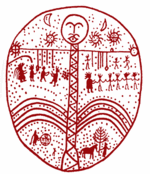Similar topics
"The Hermetic Writings: Survival of Ancient Egyptian Beliefs" -
Page 1 of 1
 "The Hermetic Writings: Survival of Ancient Egyptian Beliefs" -
"The Hermetic Writings: Survival of Ancient Egyptian Beliefs" -
See Esoteric Coffeehouse for the complete article.
The Hermetic Writings: Survival of Ancient Egyptian Beliefs
During the Renaissance, scholars were convinced that the surviving Hermetic fragments – notably the Corpus Hermeticum and the Emerald Tablet – originated in ancient Egypt. They believed that the Hermetic manuscripts were authored by a sage called Hermes Trismegistus, who was contemporary to the Biblical Moses and the great Pharaonic civilization. The Renaissance thinkers hence regarded with reverence the Corpus, and brilliant scholars like Marsilio Ficino, Pico della Mirandola, Cornelius Agrippa, Giordano Bruno and others sought to unveil the perennial wisdom contained in the Hermetic writings. A veritable revolution of ideas and letters was unleashed, with a flourishing of alchemy, magic, astrology and kabbalistic practices.
However, in 1614, a French classical scholar named Isaac Casaubon destroyed the magic of Hermes Trismegistus. He maintained, upon careful analysis of the Corpus Hermeticum, that the writings were not originating from ancient Egypt but from the 200-400 AD Greek circles, and that Hermes Trismegistus, far than being a contemporary of Moses, was rather a contemporary of the late Roman emperors. Undeniably, there are elements in the Corpus Hermeticum that mirror late antique Greek philosophy.
Casaubon’s deconstructive analysis may have dealt a deadly blow to the Renaissance belief in the antiquity of Hermetic writings, but it did not stop esoteric groups and thinkers from regarding them highly. Nevertheless, academic scholars avoided the analysis of the Corpus Hermeticum until the middle of the 20th century.
The first author to dabble into the Hermetic writings was, ironically, another French classical scholar – A.J. Festugiere, who wrote an impressive four-volume work only to re-affirm the purely Greek origins of the Corpus(1). He believed that the Hermetic fragments were commonplace Greek speculation that had no real value except as reiteration of late antique beliefs. Nevertheless, the pioneering work of Festugiere should not be discounted lightly, as it offers a wealth of information on the world of late antiquity and the intertwining of Hermeticism with other currents like Neoplatonism, Gnosticism or Stoicism. Moreover, Festugiere’s work may have helped a revival in Hermetic studies. Yet a new impetus was given after the World War II, particularly due to the discovery of additional Hermetic fragments in the Gnostic Library of Nag Hammadi, and also thanks to the seminal work of Frances Yates, Giordano Bruno and the Hermetic Tradition, which sparked a new scholarly interest in Hermetic writings (2). It is a new generation of Hermetic scholars, notably J.P. Mahe, G. Fowden and P. Kingsley that are changing the ways we perceive the Corpus Hermeticum (3).
What have they discovered? [...]

ankh_f_n_khonsu- Number of posts : 545
Registration date : 2008-09-15
 Similar topics
Similar topics» "Review: 'Frances Yates and the Hermetic Tradition', by Marjorie G Jones" -
» "Is There Gender Equity in Hermetic Qabalah?" -
» "Freemasonry and the Hermetic Tradition"
» "Is There Gender Equity in Hermetic Qabalah?" -
» "Freemasonry and the Hermetic Tradition"
Page 1 of 1
Permissions in this forum:
You cannot reply to topics in this forum
